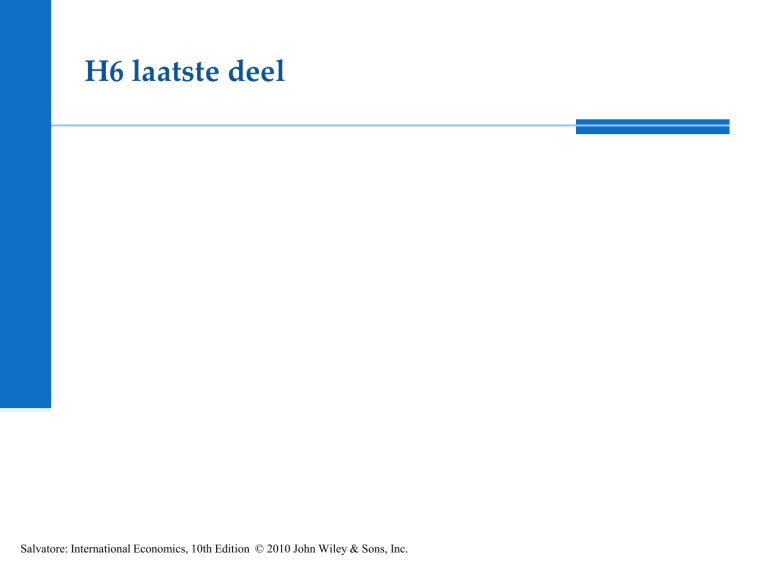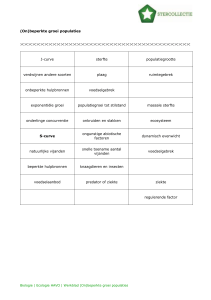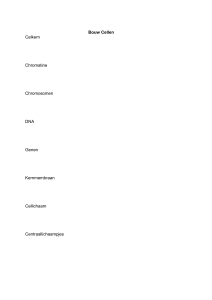
H6 laatste deel
Salvatore: International Economics, 10th Edition © 2010 John Wiley & Sons, Inc.
Transportkosten, milieustandaarden en
internationale handel
Transportkosten beinvloeden de vestigingsplaats:
bron-georienteerde industrie zal zich vestigen bij de
winningsplaats van de grondstoffen
Markt-georienteerde industrieen: Produceren
goederen die zwaarder of moeilijker te tranporteren
worden tijdens productie. Zij vestigen zich bij de
afzetmarkt.
Footloose industries: Plaatsen zich daar waar laagste
productiekosten zijn.
Salvatore: International Economics, 10th Edition © 2010 John Wiley & Sons, Inc.
Transportkosten, milieustandaarden en
internationale handel
Milieustandaarden en internationale handel
beleidsconcurrentie: kent voordelen en
nadelen. De overheden worden gedwongen
de stofkam door de regelgeving te halen. Aan
de andere kant is er het risico dat
noodzakelijke regelgeving achterwege wordt
gelaten
Salvatore: International Economics, 10th Edition © 2010 John Wiley & Sons, Inc.
Appendix Hoofdstuk 6:
Infant Industry Argument
Externe effecten en Specialisatie
De leercurve and Specialisatie
Salvatore: International Economics, 10th Edition © 2010 John Wiley & Sons, Inc.
Externe effecten en Specialisatie schaalvoordelen
Land 2 kan niet toetreden.
Salvatore: International Economics, 10th Edition © 2010 John Wiley & Sons, Inc.
De leercurve and Specialisatie
Salvatore: International Economics, 10th Edition © 2010 John Wiley & Sons, Inc.
CHAPTER S E V E N
7
International
Economics
Tenth Edition
Economic Growth and
International Trade
Dominick Salvatore
John Wiley & Sons, Inc.
Salvatore: International Economics, 10th Edition © 2010 John Wiley & Sons, Inc.
Wat ter tafel komt: dynamisch
Introductie
Groei van de hoeveelheid productiefactoren
Technische vooruitgang
Groei en handel: het kleine land
Groei en handel: het grote land
Groei, verandering in smaak en handel in
beide landen
Salvatore: International Economics, 10th Edition © 2010 John Wiley & Sons, Inc.
Growth of Factors of Production
Groei in arbeid en kapitaal verschuif de
productiefunctie naar buiten. Twee typen
groei:
Gebalanceerde groei: K en L groeien even
hard. De productiefunctie schuift evenredig
naar buiten.
Groei van alleen arbeid of kapitaal:
Als alleen arbeid groeit: output van beide
goederen groeit, maar het arbeidsintensieve
goed groeit harder. (bij kapitaal precies
andersom
Salvatore: International Economics, 10th Edition © 2010 John Wiley & Sons, Inc.
Gebalanceerde groei
- Groei van alleen kapitaal of arbeid
Salvatore: International Economics, 10th Edition © 2010 John Wiley & Sons, Inc.
Groei van de productiefactoren
The Rybczynski stelling
bij constante goederenprijzen, een groei van
de factorbeschikbaarheid (bv. arbeid
verdubbelt) zal leiden tot een relatief sterkere
groei van het arbeidsintensieve goed (meer
dan verdubbeling) en een daling van
kapitaalintensieve goed.
Door een verdubbeling van de hoeveelheid
arbeid daling van de marginale
productiviteit bij gelijke factorprijzen
moet meer kapitaal bij onttrekt kapitaal uit
andere sector
Salvatore: International Economics, 10th Edition © 2010 John Wiley & Sons, Inc.
Arbeidsintensieve goed meer dan verdubbelt (130 270), het
kapitaalintensieve goed daalt
Salvatore: International Economics, 10th Edition © 2010 John Wiley & Sons, Inc.
Technische vooruitgang
Technische vooruitgang reduceert de
hoeveelheid kapitaal en arbeid die nodig is
om een bepaalde hoeveelheid te produceren.
Drie verschillende types Hicksiaanse
technische vooruitgang:
1.
Neutraal – Groei van de productiviteit van
arbeid en kapitaal in dezelfde verhouding. De
verhouding kapitaal en arbeid blijft hetzelfde. De
relatieve factorprijzen blijven dus ook hetzelfde.
Salvatore: International Economics, 10th Edition © 2010 John Wiley & Sons, Inc.
Technische vooruitgang
Technische vooruitgang reduceert de
hoeveelheid kapitaal en arbeid die nodig is
om een bepaalde hoeveelheid te produceren.
Drie verschillende types Hicksiaanse
technische vooruitgang
1.
Neutraal
Arbeidsbesparend – Stijging van de
productiviteit van kapitaal relatief sterker dan de
productiviteitsstijging van arbeid. K/L zal stijgen bij
een gelijkblijvende verhouding w/r.
2.
Salvatore: International Economics, 10th Edition © 2010 John Wiley & Sons, Inc.
Technische vooruitgang
Technische vooruitgang reduceert de
hoeveelheid kapitaal en arbeid die nodig is
om een bepaalde hoeveelheid te produceren.
Drie verschillende types Hicksiaanse
technische vooruitgang
1.
Neutraal
2.
Arbeidsbesparend
Kapitaal-besparend – Stijging van de
productiviteit van arbeid relatief sterker dan de
productiviteitsstijging van kapitaal. K/L zal
dalen bij een gelijkblijvende verhouding w/r.
3.
Salvatore: International Economics, 10th Edition © 2010 John Wiley & Sons, Inc.
Technische vooruitgang
Neutrale technische vooruitgang in de
productie van beide goederen verschuift de
productiefunctie gelijkmatig naar buiten.
(zelfde als gebalanceerde factorgroei)
Salvatore: International Economics, 10th Edition © 2010 John Wiley & Sons, Inc.
Neutrale technische vooruitgang in de productie van één
van de goederen verschuift de productiefunctie naar
buiten.
FIGURE 7-3 Neutral Technical Progress.
Salvatore: International Economics, 10th Edition © 2010 John Wiley & Sons, Inc.
Groei en handel: het kleine land:
Een klein land beinvloedt niet de
wereldmarktprijs
Salvatore: International Economics, 10th Edition © 2010 John Wiley & Sons, Inc.
Groei en handel: het kleine land:
Productiegroei is prohandel indien:
De productie van het exportgoed groeit relatief
harder dan de productie van het importgoed. (bij
constante relatieve prijzen)
Consumptiegroei is prohandel indien:
De consumptie van importgoederen van dit land
relatief sterker stijgt dan de consumptie van
exportgoederen.
Salvatore: International Economics, 10th Edition © 2010 John Wiley & Sons, Inc.
Groei en handel: Het kleine land
Wat er gebeurt met de handel hangt af van de netto
veranderingen van de consumptie en de productie.
Hieronder gaan we het geval pro-trade in consumptie en
productie verder uitwerken.
Pro trade
antitrade
Consumptie
Importproduct groeit
sneller dan
exportproduct
Exportproduct groeit
sneller dan import
product
productie
Exportproduct groeit
sneller dan import
product
Importproduct groeit
sneller dan
exportproduct
Salvatore: International Economics, 10th Edition © 2010 John Wiley & Sons, Inc.
Productie en consumptie “pro trade”
1. Wat is export product?
y
C
c
w
x
Salvatore: International Economics, 10th Edition © 2009 John Wiley & Sons, Inc.
Productie verandert “pro trade”
uitgangssituatie
y
i
m
p
o
t
e
n
exporten
Salvatore: International Economics, 10th Edition © 2009 John Wiley & Sons, Inc.
x
Productie verandert “pro trade”
X is export product dus pro trade: X groeit relatief hard.
y
Nieuwe productielijn
x
Salvatore: International Economics, 10th Edition © 2009 John Wiley & Sons, Inc.
Productie “pro trade”
De prijs blijft hetzelfde dus productie x stijgt en y daalt
y
Nieuwe productielijn
x
Salvatore: International Economics, 10th Edition © 2009 John Wiley & Sons, Inc.
consumptie “pro trade”
De consumptieverandering pro trade dus men wil relatief meer
Y gaan consumeren: (meer van het importproduct)
y
Nieuwe productielijn
x
Salvatore: International Economics, 10th Edition © 2009 John Wiley & Sons, Inc.
Productie en consumptie “pro trade”
De consumptieverandering pro trade dus men wil relatief meer
Y gaan consumeren:
y
I
m
p
o
t
e
n
o
u
d
i
m
p
o
t
e
n
Nieuwe productielijn
exportern
Exporten oud
Salvatore: International Economics, 10th Edition © 2009 John Wiley & Sons, Inc.
x
Welvaartseffecten
Wat het met de welvaart doet is afhankelijk van:
-Productie en consumptie-effecten
-Welke productiefactor groeit. Indien arbeid vermeerdert zal de
welvaart eerder afnemen.
In de volgende sheet: verdubbeling van de hoeveelheid arbeid
Salvatore: International Economics, 10th Edition © 2009 John Wiley & Sons, Inc.
Voorbeeld Kleine land: verdubbeling van de hoeveelheid arbeid.
Wat doet de welvaart per arbeider?
(Figure continues on next slide)
Salvatore: International Economics, 10th Edition © 2010 John Wiley & Sons, Inc.
Af te leiden offercurve
FIGURE 7-4 (continued)
Salvatore: International Economics, 10th Edition © 2010 John Wiley & Sons, Inc.
Groei en handel: Het grote land
Welvaartseffect
Verandering in output per arbeider door groei.
Veranderingen door ruilvoetveranderingen. bij antihandel groei: minder export goederen minder import
Pro trade
antitrade
Consumptie
Importproduct groeit
sneller dan
exportproduct
Exportproduct groeit
sneller dan import
product
productie
Exportproduct groeit
sneller dan import
product
Importproduct groeit
sneller dan
exportproduct
Salvatore: International Economics, 10th Edition © 2010 John Wiley & Sons, Inc.
Verslechtering van de ruilvoet grote land
Zonder ruilvoet verandering (klein land)
Met ruilvoet verandering (groot land)
(Figure continues on next slide)
Salvatore: International Economics, 10th Edition © 2010 John Wiley & Sons, Inc.
Groot land 1 verslechtering ruilvoet
FIGURE 7-5 (continued)
Salvatore: International Economics, 10th Edition © 2010 John Wiley & Sons, Inc.
(Figure continues on next slide)
FIGURE 7-7groei met verbeterde ruilvoet
Salvatore: International Economics, 10th Edition © 2010 John Wiley & Sons, Inc.
Groei met verbeterende ruilvoet
FIGURE 7-7 (continued)
Salvatore: International Economics, 10th Edition © 2010 John Wiley & Sons, Inc.
Groei en handel: Het grote land (extreem
geval)
Verpauperende groei
De verslechtering van de ruilvoet is dusdanig dat
het de positieve productie-effecten teniet doet.
Salvatore: International Economics, 10th Edition © 2010 John Wiley & Sons, Inc.
FIGURE 7-6 Immiserizing Growth. (verpauperende groei)
Salvatore: International Economics, 10th Edition © 2010 John Wiley & Sons, Inc.
Groei, verandering in smaak en handel in
beide landen
Met gebalanceerde groei en neutrale technische
ontwikkeling in beide goederen:
Offercurven schuiven naar buiten.
Handelsvolume groeit:
Salvatore: International Economics, 10th Edition © 2010 John Wiley & Sons, Inc.
Groei en handel in beide landen.
1 1* pro-trade
1 1’anti-trade
2 2* pro-trade
2 2’anti-trade
E3: groei land 2
E2: groei land 1
Salvatore: International Economics, 10th Edition © 2010 John Wiley & Sons, Inc.
Rekenvoorbeeld Rybczynski stelling
Product X: Arbeid : kapitaal Product Y: Arbeid: kapitaal:
4 : 1
1 : 2
Voorbeeld 0:
Totaal A:K
5:3
4X + 1Y = 5 en 1X + 2Y = 3
Y = 5 – 4*X
dus 1X + 2*(5 – 4X) = 3
X + 10 – 8X = 3 -7 X = -7 X = 1 en Y = 1
Voorbeeld 1: Verdubbeling van de hoeveelheid arbeid
A:K
10
:
3
4X + Y = 10 en 1X + 2Y = 3
Y = 10 – 4X en dus X + 20 – 8X = 3
-7X = -13
X = 2 3/7
en Y = 2/7
X meer dan verdubbeld terwijl Y daalt
Salvatore: International Economics, 8th Edition © 2004 John Wiley & Sons, Inc.
Opgave 5,7,11
Int 12 VWO opgaven
Salvatore: International Economics, 8th Edition © 2004 John Wiley & Sons, Inc.












